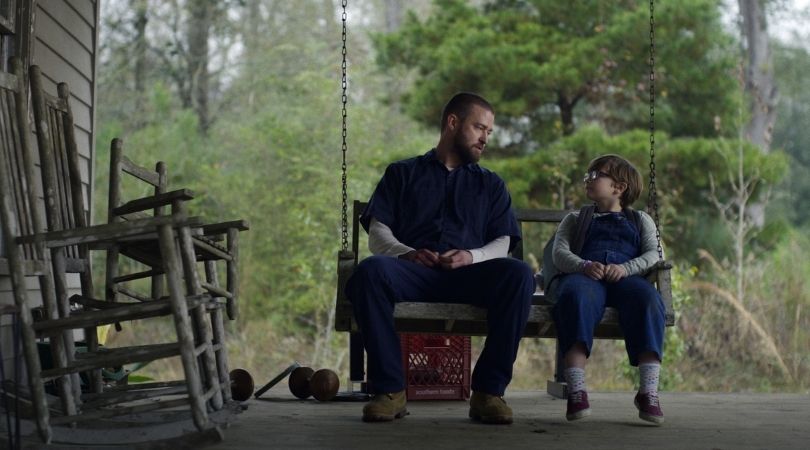
Blood doesn’t make your family. That’s a concept that I carry with me throughout my life and most certainly when I watch films. The Apple Original film Palmer, written by Cheryl Guerriero and directed by Fisher Stevens, offers up a wholesome and emotional look at found family and the bonds that form when you least expect it.
In the film, Eddie Palmer (Justin Timberlake) is a former high school football star who went from beloved athlete and hometown hero to convicted felon. The film begins at the end of Palmer’s 12-year sentence in a state penitentiary. He returns home to Louisiana, where he moves back in with Vivian (June Squibb), the grandmother who raised him. A shell of a person, Palmer moves through life with the reminders of his glory days and a small-town community that refuses to believe he can be anyone good.
But, things become more complicated when Vivian’s hard-living neighbor Shelly (Juno Temple) disappears on a prolonged bender, leaving her 7-year-old son Sam (Ryder Allen) in Palmer’s reluctant care. In time, Palmer is drawn into a more hopeful world as he forges a connection with Sam through their shared experience of being made to feel different by those around them.
Truth be told, the film is a paint-by-numbers, feel-good story. You can see the ending and plot points coming before they do, and yet, it all works. The formulaic nature of Palmer is something that is embraced. The film works because of its leads and the emotional bond that Palmer and Sam share on-screen. Palmer’s transition from a dejected and quiet man who is just looking to making it through parole to a protective father-figure is stunningly executed. As our lead, Timberlake—even with a less than stellar southern twang—brings an emotionally hardened character who we get to see become vulnerable as his relationship with Sam deepens.

The star of the film, however, is Allen as Sam. Sam is a joyous and precocious child. He speaks his mind. He embraces who he is. And he apologizes for none of it. The beauty of childhood is that you can embrace who you are; the struggle is whether the world around you does. Sam is in love with princesses and unicorns and uses Vivian’s make-up to be closer to her. As such, he’s the target of bullying from other children and of abuse by adults. But what I appreciate about the way this film tackles this issue of masculinity and identity is that Palmer, while unsure of what he should do in the beginning, never shames or tries to change Sam.
Sure, there are a couple of moments where Palmer doesn’t understand, and he has to break down his own ideas of gender instilled in him by his small, southern town. But never once does he take this out on Sam. Instead, in those moments, Palmer explains to Sam that the world could hurt him and allows Sam to make the choice. This means that while Palmer is reluctant to buy Sam a princess costume, he does it when Sam shows that it’s truly what will make him happy. Sam comes first, always.
Palmer is more changed by Sam than he changes his surrogate son. He learns how to be a parent, how to love, and ultimately how to support his child in a way that will help him grow, not shrink. It’s a loving look at acceptance and love that we don’t often get. But the reason this is so important is that too often when we see stories in small southern towns about confronting gender stereotypes and expectations, it’s done so through the lens of trauma for the character breaking them. While Sam is not untouched by traumatic events, the center of the story is not that. It is instead a look at the love that can form around you and protect you, even if you’re not connected to the person by blood.
Overall, the film isn’t something that is revolutionary or breathtaking, but it is wholesome. It’s a story about fatherhood, love, and acceptance. It’s a film about nurturing those you love instead of changing them. And finally, it’s a narrative that shows healing instead of pain. While Palmer isn’t perfect, it is just what I needed to watch right now.
Palmer is streaming exclusively on Apple TV+ on January 29, 2021.
Palmer
-
Rating - 8/108/10
TL;DR
Overall, the film isn’t something that is revolutionary or breathtaking but it is wholesome. It’s a story about fatherhood, love, and acceptance. It’s a film about nurturing those you love instead of changing them. And finally, it’s a narrative that looks show healing instead of pain. While Palmer isn’t perfect, it is just what I needed to watch right now.






